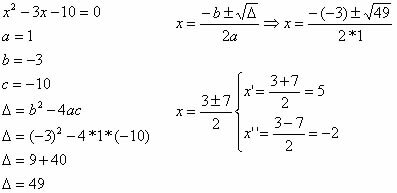You may have heard about many numbers, you may even be able to write numbers made up of several digits, but you have heard about perfect numbers and friendly numbers? Know a little about each one of them!
About 500 years before Christ, Pythagoras stood out as a great mathematician who unraveled great mysteries and reached incredible mathematical conclusions that we still use today, such as the “Pythagorean theorem”. The disciples of Pythagoras became known as Pythagoreans. They were thinkers known also for their fondness for mathematical riddles and puzzles, many of which have not been solved to this day.
It was the Pythagoreans who defined the concept of perfect numbers and friendly numbers. they said that a number is perfect if the sum of its divisors is equal to the number itself., in which case we disregard the number as its own divisor. Let's look at some examples:
The dividers of 6 are:
D (6) = {1, 2, 3}
Note that we do not cite 6 as a divisor of itself. Well then, the divisors of 6 are 1, 2 and 3. Adding these dividers, we have 1 + 2 + 3 = 6, so 6 is a perfect number. But does that happen to all numbers? Let's check it out!
VLet's look at the 8, 12 and 15 divisors, remembering that we are not going to consider the numbers as divisors of themselves!
D (8) = {1, 2, 4} → 1 + 2 + 4 = 7 ≠ 8
D (12) = {1, 2, 3, 4, 6} → 1 + 2 + 3 + 4 + 6 = 16 ≠ 12
D (15) = {1, 3, 5} → 1 + 3 + 5 = 9 ≠ 15
It seems that most numbers will not be considered perfect numbers. After 6, the next perfect number is just the 28, let's check:
D(28) = {1, 2, 4, 7, 14} → 1 + 2 + 4 + 7 + 14 = 28
They are so rare that the next perfect number is just the 496! The thirtieth perfect number is the 2.658.455.991.569.831.744.645.692.615.953.842.176. Incredible 37 digits! And the forty-fourth perfect number discovered has nearly 20 million digits!
Other special numbers are friendly numbers or friendly numbers. The Pythagoreans said that two numbers were friends if each was equal to the sum of the divisors of the other number. Let's look at an example to make it clearer. Note that again we are not going to consider the numbers as divisors of themselves:
D (220) = {1, 2, 4, 5, 10, 11, 20, 22, 44, 55, 110}
→ 1 + 2 + 4 + 5 + 10 + 11 + 20 + 22 + 44 + 55 + 110 = 284
D (284) = {1, 2, 4, 71, 142} → 1 + 2 + 4 + 71 + 142 = 220
The smallest known friend numbers are 220 and 284. The Pythagoreans believed that these numbers, like all friendly numbers, even had mystical properties. Today, almost 10,307,000 pairs of friendly numbers are known, and the best known friends today have more than 24,000 digits.
Can you find perfect numbers or two friendly numbers? Leave any special numbers you find in the comments!
By Amanda Gonçalves
Graduated in Mathematics
Related video lesson:


